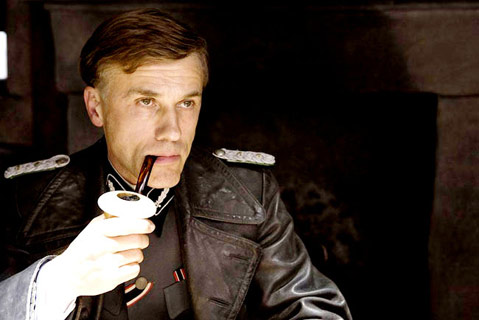Christoph Waltz on the Role of a Lifetime
Actor from Tarantino’s Inglourious Basterds Receives 2010 Cinema Vanguard Award

Audiences who saw Quentin Tarantino’s history-bucking epic Inglourious Basterds likely were surprised to walk away from the film saying, “How great was that guy who played the Nazi?” Indeed, in a movie full of kickass action sequences and graphic violence, Austrian actor Christoph Waltz emerged as the breakout star for his performance as an unscrupulous Jew hunter whose Nazi uniform belies an opportunistic streak and shifting alliances. His character, Colonel Hans Landa, is both villain and anti-hero—equally compelling and repulsive.
For his portrayal, Waltz will receive the 2010 Cinema Vanguard award from the Santa Barbara International Film Festival. He spoke to The Independent about his rise to prominence and his future career.
When you initially read for Inglourious Basterds, did it occur to you that if you did this role very well you could be up for some major awards? No. I really am proud to say that I never, ever had a single thought about awards. It was kind of a tidal wave coming my way … the movie, the story, everything connected to it—all the implications. I didn’t have any time. There was nothing left in my brain that could possibly think about awards. I was very busy with trying to come to terms with the process.
What were your initial reactions to the character? Actually, I saw the challenge. I understood that this material is enormous. How enormous, I didn’t really discover until I got into it. The more I got into it, the more I understood what’s involved and what could be involved. This part is a never-ending, bottomless thing: the further you get into it, the further you understand that there’s no end to it. So, I was so overwhelmed that I didn’t have time for anything else.
How much of the character was your own design, as opposed to direction given to you or things in the script? I don’t know. The truth is that these things emerge. There’s no other design involved other than the original. The author is essential in that the actor and even the director are guided by that North Star, if you want. All the calibration, triangulation, navigation is geared toward that North Star. From there, the things develop and emerge.
Is there anything you were told by Quentin Tarantino about Landa that we never saw in Inglourious Basterds? Most of [Landa’s] background the audience doesn’t know, but they can feel it. Like in everyday life, you meet a person and the person you meet is the result of his background. You don’t know the details and you don’t need to know the details. The actual contour, the actual gestalt is the result of everything that was going on. The same thing is true for a fictional character.
Did you have any trepidation about being an Austrian actor unfamiliar to most Americans and taking a role as a Nazi in your first major American film? No, because I never acted as a Nazi before. In 30 years, I was offered many Nazis and I never did them. Not because of ideological qualms—I didn’t do them because they were lousy roles. In this case, everything an actor could ever hope for in a part in terms of multi-dimensionality, multi-layered, mysterious, interesting, fascinating character traits that you as an actor want to discover—all of these things in one part! That’s something that does not exist! It just never comes your way.
What kinds of roles were offered to you upon the release of Inglourious Basterds? The offers come from all different corners, and that is really thrilling to see. Really across the board.
4•1•1
Christoph Waltz—along with Vera Farmiga, Peter Sarsgaard, and Stanley Tucci—will be honored with the Cinema Vanguard Award on Friday, February 12, at 8 p.m..



